
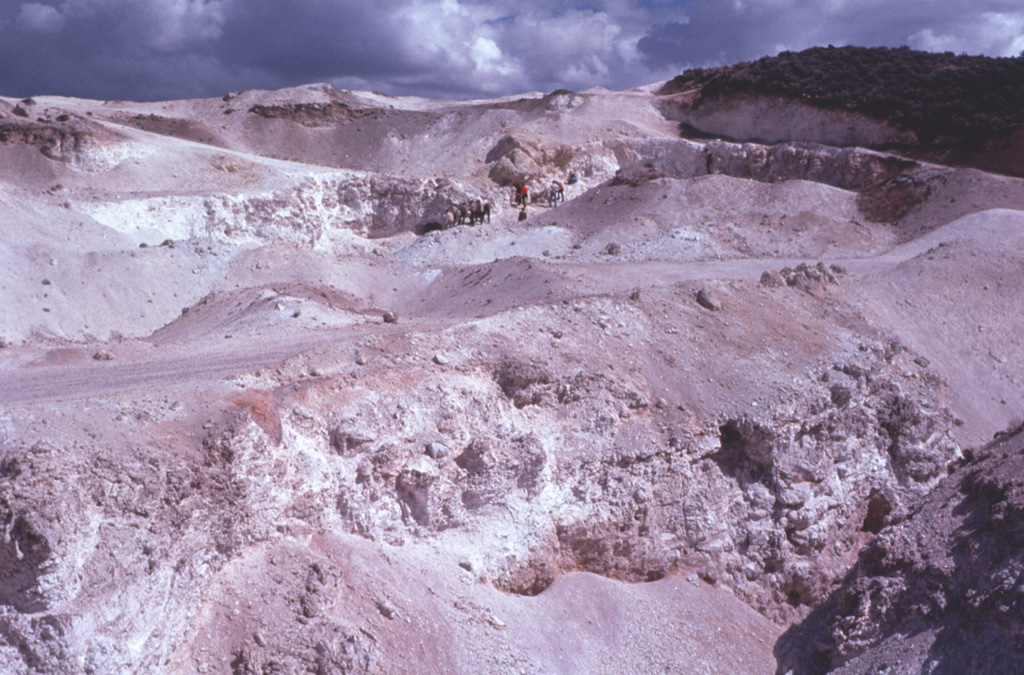
The Global Volcanism Program has no activity reports available for Steamboat Springs.
The Global Volcanism Program has no Weekly Reports available for Steamboat Springs.
The Global Volcanism Program has no Bulletin Reports available for Steamboat Springs.
|
|
||||||||||||||||||
The Global Volcanism Program is not aware of any Holocene eruptions from Steamboat Springs. If this volcano has had large eruptions (VEI >= 4) prior to 12,000 years ago, information might be found on the Steamboat Springs page in the LaMEVE (Large Magnitude Explosive Volcanic Eruptions) database, a part of the Volcano Global Risk Identification and Analysis Project (VOGRIPA).
The Global Volcanism Program has no synonyms or subfeatures listed for Steamboat Springs.
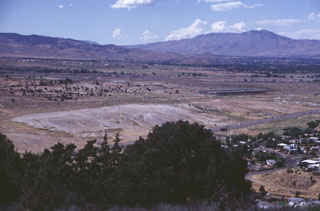 The light-colored area at the left-center is the Main Terrace, which formed along the principal fissure of the Steamboat Springs geothermal field. The N-S-trending fissure deposited siliceous sinter from hot waters that issued from surface faults and traveled down slope towards U.S. Highway 395, which cuts diagonally across the bottom of the photo. The linear structure at the right-center is the power generating plant of the geothermal field. Out of view below the trees at the lower left is the Steamboat Resort, which dates back to the 1860s.
The light-colored area at the left-center is the Main Terrace, which formed along the principal fissure of the Steamboat Springs geothermal field. The N-S-trending fissure deposited siliceous sinter from hot waters that issued from surface faults and traveled down slope towards U.S. Highway 395, which cuts diagonally across the bottom of the photo. The linear structure at the right-center is the power generating plant of the geothermal field. Out of view below the trees at the lower left is the Steamboat Resort, which dates back to the 1860s.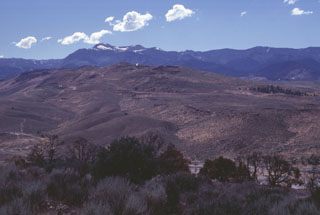 Steam rises from a geothermal well at the top of a lava-dome complex of the Steamboat Hills geothermal field in west-central Nevada south of Reno. U.S. Highway 395 traverses the valley beyond the trees in the foreground. This is the site of the Steamboat Resort, which dates back to the 1860s, when it was frequented by miners working on the nearby renowned Comstock Lode. The Carson Range forms the ridge on the horizon.
Steam rises from a geothermal well at the top of a lava-dome complex of the Steamboat Hills geothermal field in west-central Nevada south of Reno. U.S. Highway 395 traverses the valley beyond the trees in the foreground. This is the site of the Steamboat Resort, which dates back to the 1860s, when it was frequented by miners working on the nearby renowned Comstock Lode. The Carson Range forms the ridge on the horizon.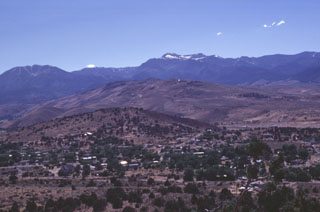 The Steamboat Hills in the center of the photo is an area of geothermal development in the Steamboat Springs volcanic field of western Nevada. The small light spot just right of the summit of the central hill is a steam plume from a geothermal well. Steamboat Springs lies in a structural trough in the eastern Sierra Nevada between the Virginia Range on the east and the western Carson Range in the background of the photo.
The Steamboat Hills in the center of the photo is an area of geothermal development in the Steamboat Springs volcanic field of western Nevada. The small light spot just right of the summit of the central hill is a steam plume from a geothermal well. Steamboat Springs lies in a structural trough in the eastern Sierra Nevada between the Virginia Range on the east and the western Carson Range in the background of the photo. Extensive areas of hydrothermally altered rock occur at Steamboat Springs, a small volcanic field of rhyolitic lava domes and flows south of Reno, Nevada. Volcanism ranges in age from 2.53 to 1.14 million years. No eruptive activity has occurred during the Holocene, although the Steamboat Springs area contains about 50 active hot springs, numerous steam vents and fumaroles, and is an actively producing geothermal field.
Extensive areas of hydrothermally altered rock occur at Steamboat Springs, a small volcanic field of rhyolitic lava domes and flows south of Reno, Nevada. Volcanism ranges in age from 2.53 to 1.14 million years. No eruptive activity has occurred during the Holocene, although the Steamboat Springs area contains about 50 active hot springs, numerous steam vents and fumaroles, and is an actively producing geothermal field. 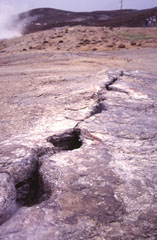 A now-inactive fissure cuts the surface of a sinter mound at Steamboat Springs in Nevada. Steam from a hot springs rises at the upper left. Steamboat Springs, an area of active geothermal development, currently displays hot springs, a large number of steam vents and fumaroles structurally related to regional faults. The area once contained about 20 small geysers, but none are currently active.
A now-inactive fissure cuts the surface of a sinter mound at Steamboat Springs in Nevada. Steam from a hot springs rises at the upper left. Steamboat Springs, an area of active geothermal development, currently displays hot springs, a large number of steam vents and fumaroles structurally related to regional faults. The area once contained about 20 small geysers, but none are currently active.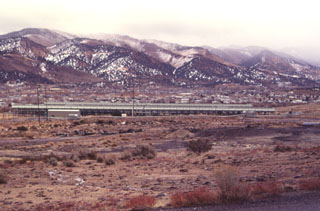 The elongated structure in the center of the photo is a power generating plant of the Steamboat Springs geothermal field. The plant is easily visible from U.S. Highway 395 and Nevada 341 south of Reno. Exploratory wells were drilled as early as the 1950s and 1960s, but the first successful well was drilled in 1979.
The elongated structure in the center of the photo is a power generating plant of the Steamboat Springs geothermal field. The plant is easily visible from U.S. Highway 395 and Nevada 341 south of Reno. Exploratory wells were drilled as early as the 1950s and 1960s, but the first successful well was drilled in 1979.There are no samples for Steamboat Springs in the Smithsonian's NMNH Department of Mineral Sciences Rock and Ore collection.
| Copernicus Browser | The Copernicus Browser replaced the Sentinel Hub Playground browser in 2023, to provide access to Earth observation archives from the Copernicus Data Space Ecosystem, the main distribution platform for data from the EU Copernicus missions. |
|
WOVOdat
Single Volcano View Temporal Evolution of Unrest Side by Side Volcanoes |
WOVOdat is a database of volcanic unrest; instrumentally and visually recorded changes in seismicity, ground deformation, gas emission, and other parameters from their normal baselines. It is sponsored by the World Organization of Volcano Observatories (WOVO) and presently hosted at the Earth Observatory of Singapore.
GVMID Data on Volcano Monitoring Infrastructure The Global Volcano Monitoring Infrastructure Database GVMID, is aimed at documenting and improving capabilities of volcano monitoring from the ground and space. GVMID should provide a snapshot and baseline view of the techniques and instrumentation that are in place at various volcanoes, which can be use by volcano observatories as reference to setup new monitoring system or improving networks at a specific volcano. These data will allow identification of what monitoring gaps exist, which can be then targeted by remote sensing infrastructure and future instrument deployments. |
| IRIS seismic stations/networks | Incorporated Research Institutions for Seismology (IRIS) Data Services map showing the location of seismic stations from all available networks (permanent or temporary) within a radius of 0.18° (about 20 km at mid-latitudes) from the given location of Steamboat Springs. Users can customize a variety of filters and options in the left panel. Note that if there are no stations are known the map will default to show the entire world with a "No data matched request" error notice. |
| UNAVCO GPS/GNSS stations | Geodetic Data Services map from UNAVCO showing the location of GPS/GNSS stations from all available networks (permanent or temporary) within a radius of 20 km from the given location of Steamboat Springs. Users can customize the data search based on station or network names, location, and time window. Requires Adobe Flash Player. |
| Large Eruptions of Steamboat Springs | Information about large Quaternary eruptions (VEI >= 4) is cataloged in the Large Magnitude Explosive Volcanic Eruptions (LaMEVE) database of the Volcano Global Risk Identification and Analysis Project (VOGRIPA). |
| EarthChem | EarthChem develops and maintains databases, software, and services that support the preservation, discovery, access and analysis of geochemical data, and facilitate their integration with the broad array of other available earth science parameters. EarthChem is operated by a joint team of disciplinary scientists, data scientists, data managers and information technology developers who are part of the NSF-funded data facility Integrated Earth Data Applications (IEDA). IEDA is a collaborative effort of EarthChem and the Marine Geoscience Data System (MGDS). |